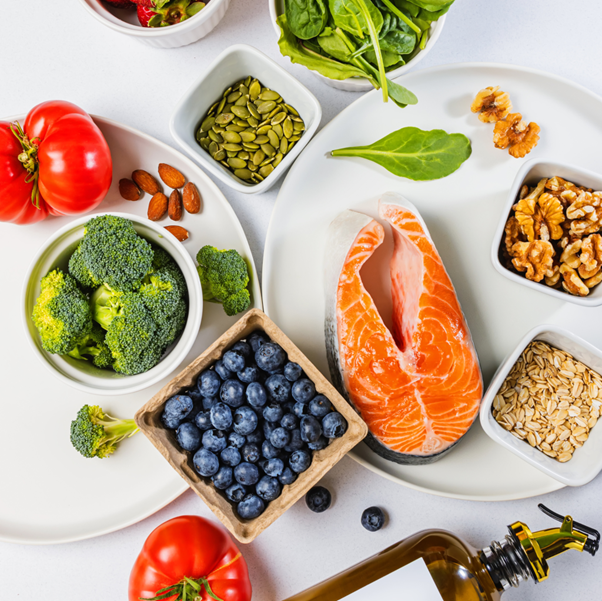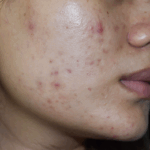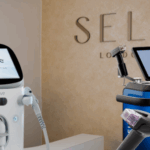
Healing after laser resurfacing, microneedling or minor skin surgery is not a passive process. It is one of the most metabolically demanding tasks the body undertakes. New tissue must be generated, collagen laid down and remodelled, blood vessels grown to supply the skin, and the immune system activated to prevent infection. Each of these steps depends on adequate nutrition.
Research shows that patients with poor nutritional status are more likely to experience delayed healing, wound breakdown, or worse scars. By contrast, those who are well-nourished recover more quickly, have fewer complications, and achieve better outcomes. At Self London, we understand that nutrition is just as important to your procedure as the laser itself.
Why nutrition matters
Healing occurs in defined stages:
- Haemostasis: blood clotting seals the wound
- Inflammation: immune cells clear debris and defend against infection
- Proliferation: new collagen, blood vessels, and skin cells form
- Remodelling: collagen is reorganised and scar strength increases
Each stage requires specific nutrients. Vitamin K and calcium enable clotting; protein and zinc drive new tissue growth; vitamin C stabilises collagen fibres; and iron delivers oxygen to healing cells. If even one is lacking, the process slows. A historical example is scurvy: vitamin C deficiency caused sailors’ wounds to reopen because collagen could not form.
Macronutrients: the foundation of repair
Protein
Protein is the cornerstone of healing. It provides amino acids to build collagen, new blood vessels, enzymes and immune cells. Low protein intake increases the risk of wound breakdown and infection. Clinical guidance recommends around 1.2-1.5 g of protein per kilogram of body weight per day after procedures.
- Arginine supports collagen deposition and blood flow
- Glutamine fuels rapidly dividing immune and skin cells
Good sources: lean meat, fish, eggs, dairy, legumes, tofu, nuts. Protein supplements can help when appetite is low.
Energy and carbohydrates
Healing increases metabolic demand. If calories are too restricted, the body diverts protein from repair and breaks down muscle for fuel. Carbohydrates supply glucose, the preferred energy source for healing tissue. Even in diabetes, sufficient carbohydrate is required for repair, though blood sugar must remain controlled.
Fats
Fats provide energy, form cell membranes, and allow absorption of fat-soluble vitamins (A, D, E, K). Omega-3 fatty acids from oily fish, walnuts and flaxseed modulate inflammation. Extremely low-fat diets delay repair.
Hydration
Water is vital for blood flow and nutrient delivery. A typical target is 30 ml per kilogram of body weight per day (around 2-3 litres for most adults), adjusted for activity and health status.
Micronutrients: the catalysts of healing
Vitamins
- Vitamin A: Supports new skin cell growth and immune defence. Deficiency causes fragile healing.
- Vitamin B complex: Enables energy release and collagen production. B12 and folate are critical for cell proliferation.
- Vitamin C: Indispensable for collagen maturation and vessel formation. Supplementation of 500-1000 mg per day is often advised.
- Vitamin D: Influences immunity and remodelling. Deficiency is common in the UK and linked with impaired healing.
- Vitamin E: Protects cells but should come from food, not high-dose supplements, which can worsen scars.
- Vitamin K: Is essential for clotting and the earliest phase of healing.
Minerals
- Zinc: Essential for DNA synthesis and epithelial growth.
- Iron: Delivers oxygen; deficiency reduces collagen strength.
- Copper: Enables collagen cross-linking and vessel formation.
- Magnesium: Supports protein synthesis and regulates inflammation.
- Calcium and selenium: Contribute to clotting and antioxidant defence.
Who is at risk of deficiency?
- Vegetarians and vegans: They may lack B12, iron, zinc, calcium, and omega-3s. Studies show poorer healing in some plant-based patients. Supplementation with B12, and sometimes iron or zinc, is advised.
- Older adults: Often face reduced appetite, lower protein reserves, and vitamin D or B12 deficiencies. Protein supplementation may be required.
- Patients on weight-loss drugs: GLP-1 receptor agonists reduce appetite, sometimes leading to insufficient protein and micronutrient intake. This slows healing and raises complication risk.
- Patients with restrictive diets or malabsorption: This includes those post-bariatric surgery, with coeliac disease, or inflammatory bowel disease. Deficiencies in protein, iron, zinc, and fat-soluble vitamins are common.
Preparing for your laser procedure
To optimise your recovery and ensure the best results from your laser procedure, consider the following nutritional and lifestyle guidelines:
- Include protein at every meal
- Maintain steady energy with wholegrain carbohydrates
- Eat a variety of fruits and vegetables
- Add healthy fats such as olive oil, nuts, and oily fish
- Avoid crash diets or prolonged fasting
- Vegans and vegetarians should supplement B12 and may need iron, zinc, or omega-3
- Patients on weight-loss drugs should be vigilant about protein intake
- Stay hydrated
- Stop smoking if possible, as it reduces oxygen delivery
- Keep blood glucose controlled in diabetes
After your laser procedure
Continue protein-rich meals, daily vitamin C intake and hydration. Supplements may be advised for known deficiencies (D, B12, iron). Avoid starting new supplements without guidance, particularly high-dose vitamin E, which may impair scarring. Prioritise rest and sleep, as tissue repair peaks during rest.
When to seek advice
Inform your dermatologist if you:
- Follow a strict plant-based diet
- Take GLP-1 medication
- Have a history of anaemia or deficiency
- Have digestive conditions affecting absorption
Blood tests or referral to a dietitian may be appropriate.
Summary
Nutrition is central to recovery after skin procedures. Protein, energy, vitamins and minerals work together to rebuild tissue. Patients with restricted diets, older adults, and those on weight-loss medication are at higher risk of deficiency. Addressing nutrition before and after treatment improves healing, reduces risks and supports the best possible outcome for your skin.
Frequently asked questions about nutrition and laser healing
Which nutrients matter most after a laser procedure?
Protein, vitamin C, zinc and iron are particularly important, but overall balance matters most.
Should I take supplements before my procedure?
Only if you are deficient or at risk. High-dose supplements without medical advice can be harmful.
How much protein do I need?
Around 1.2-1.5g per kilogram of body weight per day during healing.
Does hydration really affect skin repair?
Yes. Dehydration reduces blood flow and nutrient delivery, slowing repair.
Are vegans at higher risk of healing problems?
Yes, unless carefully supplemented with vitamin B12 and other key nutrients such as iron and zinc.
Book your consultation at Self London
At our medical dermatology, laser and lifestyle clinic on Harley Street, we combine advanced dermatology with evidence-based lifestyle strategies. Nutrition is part of that care. By optimising diet before and after your procedure, we help ensure faster healing, safer recovery, and better results.
Book your consultation today at our clinic on Harley Street and discover how our consultant-led team supports every aspect of your skin health.





